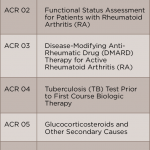In the first scene of the Broadway stage adaptation of Harper Lee’s To Kill a Mockingbird, young Scout contemplates two words she has heard in the courtroom: “All rise,” and wonders if they really are meant to elevate the minds of all those present for the proceedings. That instruction—“All rise”—serves as a leitmotif throughout the play, a reminder of something higher or greater that can be achieved if we put forth our best efforts.
At the ACR, we are committed to providing to all rheumatology professionals what we need to excel in our specialty. Put another way, the ACR seeks to enable us all to heed the call to rise—quite literally, as it turns out. The Rheumatology Informatics System for Effectiveness registry, better known as RISE, is now the largest rheumatology registry in the world. It is a remarkable tool with vast potential to improve patient outcomes and advance clinical research through data collected on almost 2 million unique patients so far. With RISE, we can reach some of the highest goals we set for our specialty in the care of our patients with rheumatic disease.
Where We Are
The RISE registry was started in 2014 to help clinical rheumatology professionals navigate the ever-evolving federal reporting requirements for reimbursement and incentive payments. Cognizant of the burden these requirements for data collection place on busy practitioners, the ACR developed RISE to automatically extract patient data from the electronic health record (EHR) systems of participating providers, including some data captured in their notes, with no additional demand on their time to collect those data for reporting purposes. The extracted data are used to populate an analytics dashboard that displays each provider’s performance on a number of quality metrics.
Originally intended to help clinicians report to the Centers for Medicare & Medicaid Services (CMS) for the Physician Quality Reporting System (PQRS), RISE has since been adapted to serve rheumatology providers who need to report for CMS’ current Quality Payment Program via the Merit-Based Incentives Payment System (MIPS) pathway. Since its launch, RISE has enabled participating providers to successfully navigate and report in these incentive-based programs, as well as gain the rewards bestowed by these systems for high performance.
The RISE registry has also been an important tool for tracking the quality of care provided to rheumatology patients. With both rheumatology-specific and rheumatology-related general practice quality measures, providers using RISE can see how well they perform on dozens of metrics that indicate quality of care. Further, the data gathered through RISE is providing the rheumatology community with a new understanding of clinical practices, including treatment patterns and patient outcomes. However, the promise of the registry goes beyond payment reporting and tracking practice patterns.
With the strong foundation the RISE registry has established, we are poised to realize the full potential of RISE to add greater value to our specialty. But to best identify the areas of greatest impact to which we should direct our efforts for the next phase of RISE, we needed the input of our members and other stakeholders. To this end, the ACR convened the RISE Summit, which took place this past May in Washington, D.C.
Where We’re Going
The Summit called together a diverse group of individuals to discuss the rheumatology community’s future needs and how RISE could best meet them. Attendees included clinicians, practice administrators, researchers, rheumatology leaders and more. Based on their input, the ACR mapped the path for the future of RISE, beyond just supporting us in federal reporting and individual quality improvement. Here are the exciting areas into which RISE will now expand.
- Collecting long-term clinical data and patient-reported outcomes data: The need for longitudinal data on our patients is immense, especially with regard to long-term outcomes. These data will serve as one way to validate the importance of access to rheumatologic care to prevent disability and reduce the burden of disease. Likewise, there is a need to meet the growing demand to incorporate patient feedback.
- Characterizing clinical practice patterns, identifying high-quality providers, provider benchmarking: The need for practitioners to learn how they are doing compared with their peers has long been unmet. RISE now has the potential to be used to collect, analyze and report these data, and it is creating a large network of providers who can learn from each other, share valuable experiences and provide mentorship beyond individual practices.
- Quality measure development and testing: RISE can provide the means to validate new quality measures in our specialty. For example, work is already underway to develop risk-adjusted outcome measures rather than just process measures. With RISE, we continue to expand our quality measures portfolio into other disease areas and measurement domains.
- Studying rare diseases and special populations: Through the collection of clinical data on almost 2 million patients to date, the ability to study thousands of patients with a rare disease is now possible. Further, advancements in disease phenotyping using natural language processing to analyze free text would significantly improve our ability to identify patients who are part of special populations or have rare diseases that lack clear diagnosis codes.
- Addressing value-based reimbursement: Based on its success as a tool for federal reporting requirements, we have an opportunity to expand RISE to help rheumatology providers succeed in value-based reimbursement programs from both public and private payers.
Together, the participants in the Summit delved into the ways these areas were important to the rheumatology community and envisioned what expansion into these areas would look like. This invaluable input will lay the groundwork for how RISE will help lead the rheumatology community into the future. RISE, like the call in the courtroom, focuses our efforts to achieve the highest level of evidence-based improvement in the care of our patients.
Participation in the RISE registry is a benefit available to all ACR members without charge. Join now, and see how RISE can help move us all forward in quality improvement and beyond.
 Paula Marchetta, MD, MBA, is a rheumatologist in New York City and the CEO and managing partner of Concorde Medical Group, a multi-specialty private group practice affiliated with NYU Langone Health. She teaches at NYU School of Medicine, where she is a clinical professor. Dr. Marchetta is the 82nd ACR president.
Paula Marchetta, MD, MBA, is a rheumatologist in New York City and the CEO and managing partner of Concorde Medical Group, a multi-specialty private group practice affiliated with NYU Langone Health. She teaches at NYU School of Medicine, where she is a clinical professor. Dr. Marchetta is the 82nd ACR president.



